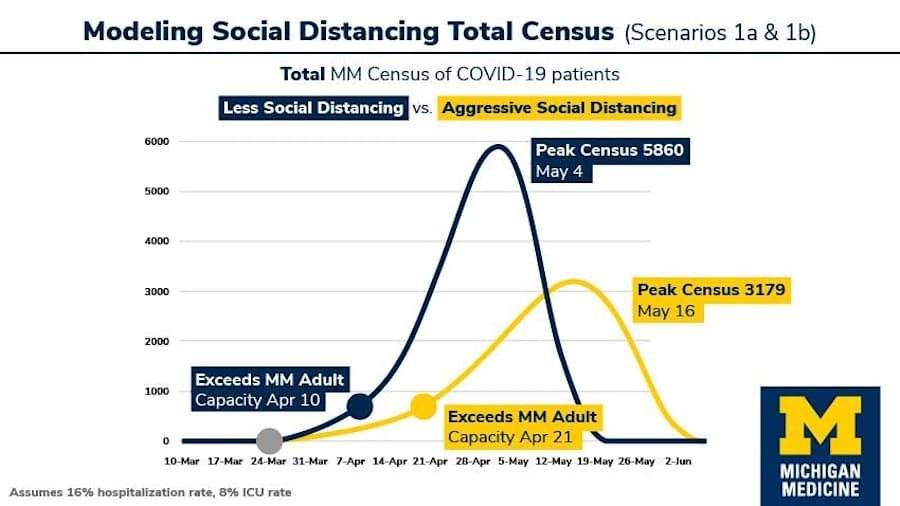DETROIT – Michigan Medicine is pushing everyone to practice aggressive social distancing amid the coronavirus (COVID-19) outbreak.
Their experts project that if everyone does their part, they could have 65 percent fewer patients in their hospitals in early May.
READ: Experts project aggressive social distancing could drastically reduce Michigan COVID-19 cases by May
Michigan Medicine released two projections on Tuesday, one with aggressive social distancing and one with less aggressive actions. They hope it will demonstrate what a difference we can each make in flattening the curve.

They released a chart showing two scenarios of what could happen at Michigan medicine in terms of the number of hospitalized patients. The blue line is less social distancing and the orange line is if we have aggressive social distancing. The higher curve represents a worse case scenario.
In the model with less social distancing the peak census they project on May 4 would be about 5,800 patients in their hospitals. The lower model, with aggressive social distancing, the census on that day day is expected to be about 2,000 patients.
What does aggressive social distancing mean?
It requires people to stay home except for urgent needs like groceries or picking up medicine. It also means not inviting neighbors, family members or friends over. It means keeping businesses closed, schools closed and having contact with the fewest possible individuals outside of your own household.
Michigan Medicine is working to increase capacity for patients. They are assessing locations outside of their hospitals.
They said they expect to reach physical capacity in their hospitals sometime within the next two weeks. That’s why they are preparing for alternate sites and why they’re asking everyone to help reduce their need for that.
MORE: What the CDC says you should do if you believe you have coronavirus (COVID-19)
How COVID-19 Spreads
Person-to-person spread
The virus is thought to spread mainly from person-to-person.
- Between people who are in close contact with one another (within about 6 feet).
- Through respiratory droplets produced when an infected person coughs or sneezes.
These droplets can land in the mouths or noses of people who are nearby or possibly be inhaled into the lungs.
Can someone spread the virus without being sick?
- Spread is possible before people show symptoms. People who are not showing symptoms can still be carrying the virus and can still pass it on to other people.
Spread from contact with contaminated surfaces or objects
It may be possible that a person can get COVID-19 by touching a surface or object that has the virus on it and then touching their own mouth, nose, or possibly their eyes, but this is not thought to be the main way the virus spreads.
How easily the virus spreads
How easily a virus spreads from person-to-person can vary. Some viruses are highly contagious (spread easily), like measles, while other viruses do not spread as easily. Another factor is whether the spread is sustained, spreading continually without stopping.
Prevention & Treatment
There is currently no vaccine to prevent coronavirus disease 2019 (COVID-19). The best way to prevent illness is to avoid being exposed to this virus. However, as a reminder, CDC always recommends everyday preventive actions to help prevent the spread of respiratory diseases, including:
- Avoid close contact with people who are sick.
- Avoid touching your eyes, nose, and mouth.
- Stay home when you are sick.
- Cover your cough or sneeze with a tissue, then throw the tissue in the trash.
- Clean and disinfect frequently touched objects and surfaces using a regular household cleaning spray or wipe.
Wash your hands often with soap and water for at least 20 seconds, especially after going to the bathroom; before eating; and after blowing your nose, coughing, or sneezing.
Click here for more guidelines from the CDC.
People who think they may have been exposed to COVID-19 should contact their healthcare provider immediately.
Question about coronavirus? Ask Dr. McGeorge here.



